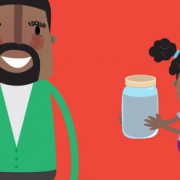Joyful bubbles
For this activity, you will need commercial or homemade bubble solution and wands. Here’s a recipe for homemade bubble mix.
Bubble mix recipe
Combine the following ingredients:
1/4 cup of dish soap (any Dawn product, or Dawn with “Olay hand renewal” works very well)
1/4 cup of cool water
1 tsp. sugar
Use any circular item to blow bubbles. If you don’t have any traditional bubble-blowing wands, the handle of a pair of scissors works well, but first tape the blades closed and wrap the blade end in a protective cover, such as bubble wrap, to prevent injuries.
Have fun blowing bubbles together outside. If it isn’t warm enough to play outside, you can still blow bubbles indoors at bath time. A fun song to sing while blowing bubbles is Jesus’ Love is a Bubblin’ Over. After your children are tired of blowing bubbles themselves, suggest that they take a break from blowing and try to pop the bubbles that you blow. When they are done blowing and chasing bubbles, call your children together and tell them this make-believe story. (Feel free to change it to personalize it for your kids.)
Bubble-time story
Once upon a time, there was a little girl named Karis. Karis was a normal girl who lived in a normal home with a very normal family. But she thought her life was abnormally boring. She desperately wanted to be a princess. If only I could live in a palace! she thought. If I could live in a palace and have all the privileges of a princess, my life would be full of joy.
As she fell asleep one night, Karis wished – for the one hundred and first time – that she could one day become a princess. Moments later, much to Karis’ surprise, a huge butterfly flew through her window and spoke to her. The butterfly told her that she had been chosen as the next princess of the Land of Chara, and that they must fly there right away.
Away through the dark night they flew, eventually arriving at their destination. As they flew down toward the Land of Chara, Karis noticed that the streets were golden. When the butterfly showed Karis her new bedroom and gave her a tour of the royal palace, Karis thought that she would be incredibly happy in her new role. Her room was full of hundreds of dolls, complete with a tiny kitchen that had mini-appliances of every kind, including a fridge, an oven and a dishwasher – and they all worked!
The butterfly told Karis to put on an extravagant gown and get ready for a royal feast. As she quickly dressed, she wondered what kind of food would be served at the party. Almost as soon as Karis had fastened her gown, she noticed that the lace at the neck and the sleeves had begun to itch. Soon, Karis wished she could take the dress off, but she thought to herself, If this is what I must do to be a princess, then I will have to leave the gown on.
At the feast there were many people Karis didn’t recognize, but they all smiled at her and bowed or curtsied when she walked past. It seemed as though everyone was almost afraid to talk to her because she was royalty. The food that was brought to her table was wonderful; it was pizza with all her favourite toppings, and tiny hamburgers with exquisite miniature fries. For drinks, there were five different flavours of milkshakes to choose from. Karis chose chocolate and strawberry. For dessert, they rolled out a very large tray full of fancy cakes and candy. There were more treats on the tray than Karis had ever seen all at once, and she got to choose whatever she wanted.
After dinner, everyone went outside for a carnival. There were rubber inflatables, giant slides and even a climbing wall. Pretty bubbles floated through the air, generated by automatic bubble-making machines. Although everyone seemed to be having a grand time, Karis felt a little lonely wandering around and playing by herself at the different attractions. She also was a little worried about the nasty-looking little dwarves who ran around popping all the bubbles, laughing as they went. Karis decided to go back to her room to play. She set the dolls up in the kitchen, but it wasn’t much fun playing alone.
By nightfall, Karis’ stomach had started to hurt and her gown had given her a horrible rash. Just as she was thinking about going to bed, the butterfly came fluttering in the window, and reminded Karis that she was now a princess, which meant she could stay up as late as she wanted. But Karis was very tired, and soon going to bed seemed like a very good idea. The bed was beautiful, but it was so high off the ground that Karis worried that she might get hurt if she fell out. As she lay in bed, she longed for her mom and dad to come and tuck her in. She wished she could hear her little brother making silly noises in the room next door. Then a frightening thought came into her mind: Will I ever see my family again? she wondered. All night long Karis tossed and turned as her worries and her aching belly disturbed her sleep.
In the morning, Karis was delighted to find herself in her own bed, in her own bedroom. She ran downstairs and found her family eating cereal for breakfast. Her younger brother was making loud slurping noises at the breakfast table as usual, but this time it didn’t bother Karis.
Later that morning, Karis told her parents about her dream and everything she experienced in the Land of Chara. Her parents listened, deep in thought, as Karis explained her dream. Then Karis’ parents offered their thoughts about the dream, and Karis saw the Land of Chara in a whole new light.
What Karis had not known was that the Land of Chara was a fake or a “counterfeit.” All the wonderful things in the dream were things that people often think they need in order to be happy. Although it was named the Land of Joy – for the word “chara” means “joy” in Greek – it was not really the land of joy at all. It was a place that offered false joy instead of true joy.
Karis’ parents explained that the only way anyone can experience true joy is through knowing Jesus. They said that there is nothing wrong with wanting to be happy, as long as a person doesn’t seek after happiness instead of seeking the joy of knowing and being with Jesus.
Then Karis’ parents told her that her name means “grace,” and that her name also came from the Greek root word for “joy.” Her mother then explained that it is because of God’s grace that everyone can have their sins forgiven and experience the joy of knowing God as a friend.
“A relationship with God will give us much joy here on earth,” her mother said, “but we will have even more joy when we go to live with God in heaven someday.” Then Karis’ father got out a Bible and read from the book of Revelation to let Karis know what heaven would be like some day. Heaven sounded much better than the land in her dream. Karis’ favourite part was the promise that in heaven there will be no more tears or pain (Revelation 21:4). Karis found herself thinking a lot about heaven in the days that followed, but never again did she wish to be a princess.
A note to parents: The Greek word for “joy” is “chara,” derived from the word “charis,” which is the Greek word for “grace.” This is important to note, for it tells us that “chara” is produced by the “charis” of God. This means that true joy is divine in origin… it is a Spirit-given expression that flourishes best in hard times.
Finish your time together by asking the following questions:
- What caused Karis to be dissatisfied?
- What are some things in your life that tempt you to be discontent?
- When are you tempted to be selfish or discontent?
- How do we find true joy?
- If the bubbles we played with represent joy, then what kind of thoughts and attitudes can pop your “joy bubbles”?
- What kind of attitudes can prevent your joy bubbles from bursting?
Key concepts
People can have everything their hearts desire and still feel empty and alone if their goal in life is to please themselves and not God. We can be joyful in “normal” circumstances – even when life gets very hard – if we love and trust God. The soap bubbles, as pretty and fun as they were, only lasted a short time. Similarly, having things, popularity and entertainment are short-lived in the length of time they entertain us or offer us fascination.
Some common joy stealers include dissatisfaction and greed (always wanting more or wanting the biggest or the best). These attitudes steal joy, but being content and generous with what we have gives us joy. True joy is found in Jesus and in sharing His love with others.
Relevant Scripture
Psalm 37:3-4 “Trust in the Lord and do good; dwell in the land and enjoy safe pasture. Take delight in the Lord, and He will give you the desires of your heart.”









